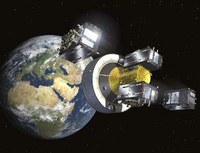
(BRUSSELS) – Europe’s satellite navigation system Galileo goes live for public authorities and businesses on Thursday, with the promise of accurate, fast and more reliable positioning for end users.
Galileo will increase geo-location precision ten-fold, claims the European Commission, enabling the next generation of location-based technologies, including autonomous cars, connected devices, or smart city services.
The EU has made a concerted effort to design and build “the most accurate satellite navigation system in the world”, according to Industry Commissioner Elzbieta Bienkowska: “It demonstrates the technological excellence of Europe, its know-how and its commitment to delivering space-based services and applications. No single European country could have done it alone,” she added.
In its initial services, Galileo will start to deliver, in conjunction with GPS, the following services free of charge:
- Support to emergency operations, with the Search and Rescue Service enabling people in distress to be found and rescued more quickly;
- More accurate navigation for citizens, with the Galileo Open Service offering a free mass-market service for positioning, navigation and timing that can be used by Galileo-enabled chipsets in smartphones or in car navigation systems. By 2018, Galileo will also be found in every new model of vehicle sold in Europe, providing enhanced navigation services to a range of devices as well as enabling the eCall emergency response system.
- Better time synchronisation for critical infrastructures, allowing more resilient time synchronisation of banking and financial transactions, telecommunications and energy distribution networks such as smart-grids.
- Secure services for public authorities, offering a particularly robust and fully encrypted service for government users during national emergencies or crisis situations, such as terrorist attacks, to ensure continuity of services.
Galileo is fully interoperable with GPS, but will offer more accurate and reliable positioning for end users. The Galileo constellation consists of 18 orbiting satellites, with a full constellation of 30 satellites foreseen by 2020.
So far, the first Galileo smartphone by Spanish company BQ is available on the market. But the Commission says other manufacturers are expected to follow suit. It will allow also application developers to test their ideas on the basis of real signal.
Galileo Initial Services are managed by the European GNSS Agency (GSA). The overall Galileo programme is run by the European Commission, which has handed over the responsibility for the deployment of the system and technical support to operational tasks to the European Space Agency (ESA).


